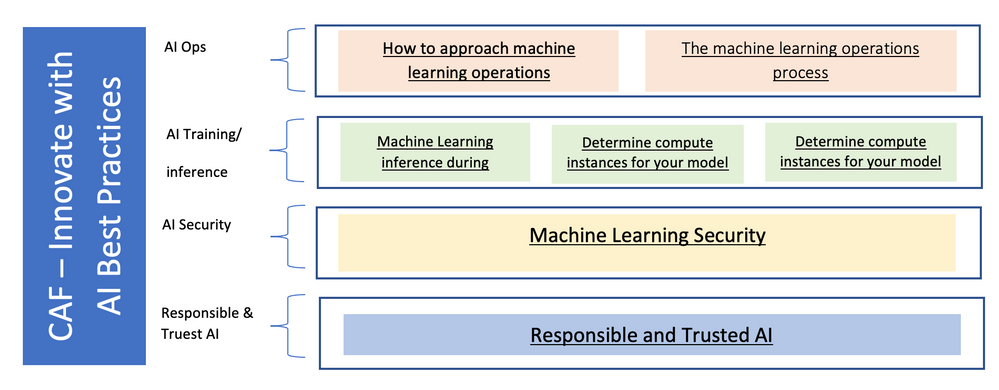This article is contributed. See the original author and article here.
Customers are looking to gain insight and value from their data in achieving their business outcome and have industry knowledge and domain expertise to build resilient data culture and customer capability. Advance analytics and AI play a pivotal role in accelerating the digital transformation journey. With the advances in powerful machine learning algorithms, democratization of computing power through cloud computing, and ever reducing cost of storage and accessible to vast amount of training data, new and sophisticated AI systems are emerging today.
So, how can we adopt AI at scale? Bringing all the experience that we have built internally at Microsoft and working along with our customers, and democratize the use of people, process, and technologies in a secure and responsible way, through the lens of enabling AI using Microsoft Cloud Adoption Framework.
So, let’s start by defining what is Cloud Adoption Framework (CAF). CAF is a collection of documentation, technical guidance, best practice, and tools. Ultimately, its goal is to enable your organization to achieve the desired business outcomes faster and adopt the cloud in a more holistic way. The objective of Enabling AI solutions using CAF is to help you align your thinking and language you are using with wider cloud adoption efforts. It will help to accelerate the delivery of your AI projects by aligning people, process, and technology with an actionable, efficient, and comprehensive way. In particularly, it is looking to address the following challenges.
At Microsoft, we have been innovating on behalf of our customers. We have many services, features, and functionality available for Data Science and AI. Despite the flexibility and options, we understand that simplicity is important. Enabling AI for CAF does exactly that, and in a prescriptive way to make AI adoption easy for organizations, making it easy to see return of AI investment quicker and gain accelerated business outcomes. |
|
What is the challenge these addresses?
First, how do you operationalize machine learning, what approach do you take to achieve ML Operationalization? This is an industry wide challenge and requires detailed thinking about the people, process and technology, which is commonly referred to as the MlOps process. MlOps amalgamates the three dimensions to provide an end-to-end enterprise scale machine learning operating motion in an iterative manner. Cloud adoption for AI provides guidelines related to environment/workspace provisioning, roles, responsibilities, process, and technology to facilitate MlOPs in an enterprise ready way.
Second, how do you determine the appropriate training and deployment compute instances for your machine learning model? The choice of compute instance can have an implication on the performance efficiency, scalability, as well as the cost. Once a model is produced, it is important to choose the correct inference target to meet the business requirements. How do you choose the correct inference target that handles the scalability, security and response time need? What is the decision process to target the correct compute instance and inference path is addressed by the CAF for AI.
Third, how do you achieve machine learning security, that not only facilitates keeping your data secure on transit and rest, but restricts in-bound and out bound traffics, both within and outside of the virtual network. On top of that, be able to provision various level of access control using RBAC and enforce policies. More importantly, be able to run experiments on PII and confidential data, without compromising the privacy and integrity of the data.
Finally, how do you ensure you implement do responsible and trusted AI? This incorporates principle of fairness, reliability, safety, privacy and security, inclusiveness transparency and accountability. An AI system needs to be reasonably be able to justify the decision it has made, and how it came to the conclusion. As well as the people who design and deploy the AI system need to be accountable for the action or decision it takes.
What are the assets available are?
The following assets are available to address above challenges. The web contents are organized into four buckets: AI Ops, AI training/inferencing, AI security and Responsible & Trust AI.
Web contents
The Web contents can be accessed by visiting the the following link (click here)
Videos
There are supplementary videos which provides end-to-end overview of the CAF innovate with AI more from a holistic perspective.
We recommend starting with the introduction video.
The introduction video outlines various concepts, terminology and building blocks for CAF.
CAF provides six pillars, which are executed in the chorological order, starting with the strategy, then plan, followed by ready and adopt, and finally govern and manage. Each video provides a detailed overview of activities that are undertaken and accomplished. Please click on each pillar below to view the videos.
When and how to use them
Every organization should consider adopting the CAF – Innovating with AI as a first principle for any AI-based workload. This would enable organizations to establish recommended operational processes and tools with best practice guidelines.
As a starting point it is important to get familiar with various terminologies and concepts underpinned by the best practices. It is therefore recommended to go through all the videos first, before covering through the web contents. The Web contents should act as a reference point throughout the lifecycle of a project/workload.
Co-authors: Donna Forlin, Pratim Das and William Mendoza
Brought to you by Dr. Ware, Microsoft Office 365 Silver Partner, Charleston SC.










Recent Comments